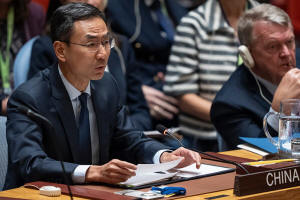UN Security Council meeting on Gaza highlights growing isolation of US
on Mideast conflict
[September 24, 2025]
By JOSEPH KRAUSS and FARNOUSH AMIRI
UNITED NATIONS (AP) — A day after France led other nations in
recognizing Palestinian statehood, the U.N. Security Council once again
aired a deep divide between the veto-wielding United States and most of
the rest of the world over how to end the war in the Gaza Strip and
resolve the Mideast conflict.
At a special session to discuss the crisis, one representative after
another expressed horror at Hamas' Oct. 7, 2023, attack and Israel's
ongoing military offensive in the Gaza Strip, which has killed tens of
thousands of Palestinians, destroyed vast areas and displaced around 90%
of the population, many of them starving. Most nations called for an
immediate ceasefire and an influx of humanitarian aid.
“Gaza has become a graveyard for humanity as well as for the global
conscience,” said Pakistan’s foreign minister, Mohammad Ishaq Dar. "The
time for words has passed. The time for action is now.”
But no such action is expected from the world body, where the United
States has shielded Israel from numerous calls for a ceasefire. Last
week, it voted against the other 14 members of the Security Council on a
resolution calling for an immediate ceasefire and the release of all
hostages.
The United States said the resolution did not go far enough in
condemning Hamas. Washington is also opposed to the latest moves to
recognize Palestinian statehood. As a permanent member of the Security
Council, it could block any path to full Palestinian membership in the
world body.

The context
The Security Council meeting once again reflected the deep isolation
that Israel and its closest ally, the United States, face when it comes
to growing international demands for accountability and an end to
Israel’s war in Gaza.
Since world leaders began arriving in New York on Monday, the topic of
Gaza and Palestinian statehood has towered over other diplomatic
discussion, with a two-state solution conference kicking off the week of
gatherings. Country after country, including most U.S. allies, used
their time in the General Assembly, the Security Council and in
bilateral meetings across the U.N. campus to bring attention to the
growing civilian death toll and the impact the nearly two-year long war
has had on Palestinian children.
During the council meeting, Israel was not present due to the Jewish new
year. The Americans, who have a top-level delegation in town, sent their
U.N. ambassador to represent them instead of Secretary of State Marco
Rubio.
But even before heads of state and government came to Manhattan, the
Security Council has held 80 meetings on the war in Gaza since Oct. 7,
2023. During those sessions, both Biden and Trump administration
officials have vetoed or rejected resolutions calling for an immediate
ceasefire, saying that the messages of support by the 14 other members
do not go far enough.
[to top of second column]
|

China's deputy permanent representative to the United Nations Geng
Shuang speaks during a Security Council meeting at the United
Nations headquarters, Tuesday, Sept. 23, 2025, at U.N. headquarters.
(AP Photo/Yuki Iwamura)

The consistent obstructions have frustrated the U.N.’s most powerful
body and have called into question its relevance and efficiency if
one permanent member can continue to veto efforts that have
near-unanimous support.
The players' responses
U.S. ambassador to the U.N. Mike Waltz said it was “regrettable”
that the council convened Tuesday's meeting on the Jewish holiday of
Rosh Hashana, a decision that he said had excluded Israel.
“This charade is disappointing,” Waltz said of the meeting. “It is
clearly fueled by domestic politics and it has given Hamas a reward
for refusing to surrender, as well as an incentive" to keep holding
48 hostages, around 20 of them believed by Israel to be alive.
He said the Security Council should instead focus on eliminating
Hamas. He blamed international action in support of the Palestinians
for the breakdown of ceasefire talks in recent weeks, and not an
Israeli strike on Hamas negotiators in Qatar, a key mediator, which
was condemned by several members of the council.
Israeli Prime Minister Benjamin Netanyahu has hinted he might take
unilateral action — like annexing parts of the West Bank — in
response to the push for Palestinian statehood. Any such action is
expected to come next week, after he pays his fourth visit to the
White House since President Donald Trump returned to office.
For other U.S. allies, including countries with close ties to
Israel, the frustration is clearly mounting.
“The war in Gaza must end. The Security Council, as the body
responsible for international peace and security, should be able to
make these demands. Indeed, this should be the bare minimum that we
can do," Danish Foreign Minister Lars Løkke Rasmussen said at
Tuesday's meeting. "Last week, 14 members of this council were
willing to do this. We hope that this can soon become all 15.”
___
Krauss reported from Ottawa, Ontario.
All contents © copyright 2025 Associated Press. All rights reserved
 |